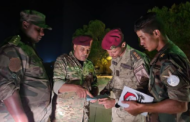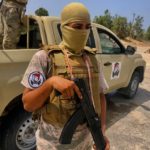Libya’s state National Oil Corporation (NOC) confirmed on June 10 that its El-Feel oilfield has been forcibly shutdown again by militias – only days after it was reopened.
In Misurata, the Military Information Division of the Libyan National Army (LNA) said that LNA fighters continued their intensive air sorties east of Misrata, which targeted a number of locations of Fayez al-Sarraj government (GNA) groups.
In Sirte, Brigade 106th of the Libyan National Army (LNA) destroyed on June 13 a number of armed vehicles of Fayez al-Sarraj government (GNA) forces in Jarif area.
In Tripoli, Anadolu Agency reported that demining experts from the Turkish Armed Forces on June 11 started clearing civilian areas.
On the international level, France hardened its tone on June 14 against Turkey, denouncing its “unacceptable” interference in Libya and ensuring that “France cannot let it go”, the Eylsee said.
EL-FEEL OILFIELD
- Libya’s state National Oil Corporation (NOC) confirmed on June 10 that its El-Feel oilfield has been forcibly shutdown again by militias – only days after it was reopened. The events at El-Feel mirror those that had occurred earlier at the Sharara oilfield. The NOC reported that commander of the “Khalid bin al-Walid Battalion”, Yousif Hassan al-Tabawi, coerced workers at El-Feel oilfield to stop production at the again, only a few days after the Hamada valve was reopened.
MISRATA
- on June 10, the Military Information Division of the Libyan National Army (LNA) said that LNA fighters continued their intensive air sorties east of Misrata, which targeted a number of locations of Fayez al-Sarraj government (GNA) groups, supported by the Turkish mercenaries, which resulted in the destruction of a Turkish air defense system in the vicinity of Abu Grein area, and the destruction of GNA artillery, which was bombing homes of civilians in Jarif area;
- LNA fighters have targeted GNA armed groups in eastern Misrata, on June 8, to stop their attempt to advance to Sirte. The Military Information Division had announced that “LNA carried out several air strikes targeting gatherings of the Turkish-backed militia forces in the axes of east Misrata”.
SHARARA OILFIELD
- in a farcical scene that embodies the state of post-Qaddafi militia Libya since 2011, the National Oil Corporation (NOC) confirmed the news late on June 9 that its Sharara oilfield did indeed briefly reopen on June 9 after the Petroleum Facilities Guard (PFG) commander who had forced the last closure relented to demands to restart production. However, only hours later, the NOC said, a second militia leader arrived from Sebha and forced the field to stop production again;
- the National Oil Corporation said Brig. Mohammed Khalifa, the commander of the oil facilities guard force in the country’s south, which answers to Haftar, requested that the operations at the Sharara oil field, about 900 kilometres (560 miles) south of Tripoli, to be halted.
SIRTE
- Brigade 106th of the Libyan National Army (LNA) destroyed on June 13 a number of armed vehicles of Fayez al-Sarraj government (GNA) forces in Jarif area west of Sirte. The Cornet Detachment of the Brigade’s Battalion 124 managed to destroy a number of armed vehicles of GNA militias, leaving behind bodies in Jarif area, said the Brigade’s media center;
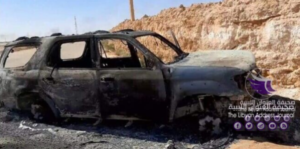
- the Libyan National Army spokesman, Major General Ahmed al-Mismari, said that five combat sorties had been carried out on the western Sirte front, targeting forces of the Tripoli-based Government of “National Accord” with airstrikes he described as “successful.” In a statement on Facebook on June 10, Al-Mismari clarified that the armed air sorties “included two reconnaissance flights around the Sebha area, during which no abnormal movement was detected in the south, while in the western Sirte region, the GNA forces retreated 90 kilometers west of Sirte.” “The withdrawal was indiscriminate and our aircrafts targeted them during the withdrawal,” he added;
- the 604th Infantry Battalion of the Libyan National Army (LNA) revealed that Fayez al-Sarraj government (GNA) militias assaulting Sirte fled beyond 50-Checkpoint west of Sirte, after their dens were destroyed by LNA artillery and fighters;
- the Libyan National Army (LNA) air defenses shot down on June 8 a Turkish drone in Jarif area, west of Sirte. The Turkish drone was trying to target the locations of LNA forces, said LNA Military Information Division;
- five Libyan Army fighters have been killed in what is believed to be Russian warplanes’ strikes on June 8, in addition to seven other civilians from one family killed in a strike on their house in Jarif town near Sirte. A source from Libyan Army said MiG 29 warplane, which Russia gave to Haftar recently, had raided Libyan Army positions in western Sirte, targeting several vehicles, including one ambulance, and killed five people – paramedics included;
- the Libyan National Army Air Force fighters destroyed, at dawn on June 8, an entire artillery detachment of Fayez al-Sarraj government’s (GNA) armed groups, backed by Turkey, as they were moving towards Sirte, killing a number of Turkish officers and Syrian mercenaries, according to LNA Military Information Division.
TARHUNA
- Libyan local media outlets published preliminary lists of the names of the mass graves’ recognized bodies in Tarhuna, which had all been killed by Kani militia and Khalifa Haftar’s forces as they were in control of Tarhuna. The list included women, children and elderly people. The list included 123 names, not all the bodies found in mass graves in Tarhuna, but only the ones recognized by their relatives as some graves hadn’t yet been unearthed.
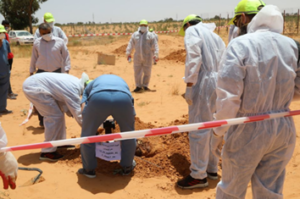
TRIPOLI
- a civilian was killed and another wounded on June 12 when a landmine left by Haftar’s forces exploded in a neighborhood south of Tripoli, said the media centre of the Volcano of Rage Operation. The media center also reported a similar incident in the Airport Road where a landmine explosion ripped through a civilian vehicle killing one person and wounding another;
- Anadolu Agency reported that demining experts from the Turkish Armed Forces on June 11 started clearing civilian areas in Libya, adding that the move comes upon the request of the Libyan government to ensure the safe return of civilians to their homes located in areas liberated from Haftar’s forces;
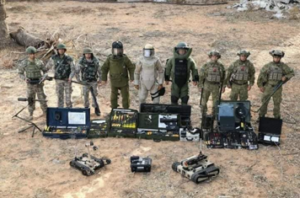
- reporting 27 deaths and 40 injuries due to landmines and IED’s in civilian areas of south Tripoli up to 9 June, the Ministry of Justice of the internationally recognized Libyan government based in Tripoli announced on June 10 that it had formed a committee to investigate these grave human rights violation;
- the media adviser of Libya’s Health Ministry Ameen al-Hashimi said on June 10 that seven people were killed and ten others were injured in mine explosions in Ain Zara and Wadi Rabea in southern Tripoli;
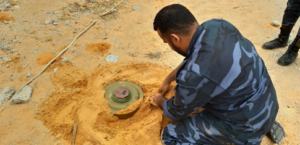
- the Search and Identification of Missing Persons Department, has recovered another 15 bodies from the liberated areas south of Tripoli, said the director of the department, Kamal Abubaker. Speaking at a press conference on June 9, Abubaker confirmed that their teams are facing significant challenges and grave risks as the areas they are working in are scattered with landmines laid by Haftar’s forces before they were forced out of Tripoli.
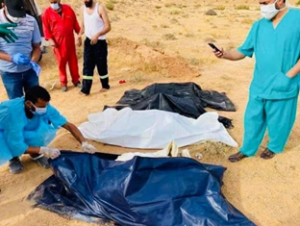
INTERNATIONAL RELATIONS
- France hardened its tone on June 14 against Turkey, denouncing its “unacceptable” interference in Libya and ensuring that “France cannot let it go”, the Eylsee said;
- the Algerian President Abdelmadjid Tebboune, said on June 14 that his country is prepared to assist the Libyans in reaching a political solution which includes both sides;
- the Tunisian Defense Minister, Imad al-Hazqi, confirmed on June 13 that there are no foreign forces in Tunisia, and that his country will not allow any foreign force to be present in it and use its territory to conduct military operations, or to establish foreign military units and bases;
- Mohammed bin Zayed, Crown Prince of Abu Dhabi, Deputy Supreme Commander of the UAE Armed Forces, and French President Emmanuel Macron have expressed their support for the Egyptian initiative to resolve the crisis in Libya;
- the Egyptian Deputy Foreign Minister for African Affairs, Ambassador Hamdi Sanad Loza, called on the members of the “Coalition for the Coast” to take a firm stance against the countries that “finance, train, and transfer terrorists from Syria to Libya, because of the threat that this poses to the neighboring countries, especially the Sahel states”;
- French President Emmanuel Macron has expressed to his Egyptian counterpart, Abdel Fattah Sisi, his support for the recently announced “Cairo Declaration”, in order to find a solution to the conflict in Libya;
- Algerian President Abdelmadjid Tebboune warned from deteriorating the situation in Libya, stressing that the conflicting parties in Syria are the same ones that are fighting in Libya as well;
- the United Nations voiced “horror” after reports that eight mass graves had been discovered in an area recently seized by the unity government after forces loyal to Khalifa Haftar withdrew. “UNSMIL notes with horror reports on the discovery of at least eight mass graves in past days, the majority of them in Tarhuna,” the UN mission said in a statement on Twitter on June 12;
- at a U.S Department of State Special Briefing on Libya (and Iraq) held in Washington DC on June 11, David Schenker, Assistant Secretary for Near Eastern Affairs, said the US sees continued (Russian) interference in Libya as a threat to its interests;
- Egyptian Foreign Minister Sameh Shoukry and Emirati Foreign Minister Abdullah bin Zayed stressed “the necessity of an immediate ceasefire in Libya, and a commitment to a political solution under the supervision of the United Nations”;
- the Canadian Foreign Minister, François-Philippe Champagne, renewed his country’s full and sole support for the Government of National Accord (GNA), as the only legitimate governing body in Libya, voicing its support for the implementation of the decisions reached in Berlin, namely the resumption of the 5 + 5 talks;
- a Turkish demining team of experts started to remove mines and IEDs planted by Khalifa Haftar’s forces in south Tripoli, Tarhuna and other areas, according to the Libyan Foreign Ministry;
- US President Donald Trump welcomed on June 10 Egypt’s proposal for Libya ceasefire in a call with Egyptian President Abdel Fattah Sisi, said the Egyptian Presidency;
- UNSMIL confirmed on June 10 that Libya’s 5+5 military talks between the internationally recognized Libyan government in Tripoli and Khalifa Haftar’s Libyan National Army (LNA) were underway. The engagement in these UNSMIL-brokered talks, created by the Berlin Libya conference outcomes, is seen by the international community as an important de-escalation step in the fighting between the two Libyan adversaries;
- Turkey has rejected the Egyptian initiative proposed to establish a ceasefire in Libya, saying through its Foreign Minister Mevlut Cavusoglu that the initiative aims to rescue Khalifa Haftar, but it is a stillborn initiative;
- as both the warring Libyan sides pour over every reported phone call and every reported utterance by the international community for signs of support, U.S. Secretary of State Pompeo on June 9 urged a quick ceasefire that would lead to political talks;
- the Turkish President Recep Tayyip Erdogan said that the descendants of one of the most loved and revered Libyan historical figures, Omar Mukhtar, are carrying on his great cause by fighting terrorists coming to their country from many sides;
- the U.S. Embassy said on June 9 that the U.S. is concerned for the continued escalation in Sirte. It said that it shares the immediate concerns about yet another humanitarian crisis in Libya – this time in Sirte;
- the EU announced on June 9 that it will continue supporting Libya in disposing of Improvised Explosive Devices (IEDs) and booby-traps, and Explosive Remnants of Wars (ERWs) found in South Tripoli;
- a joint statement on Libya released on June 9 by the EU High Representative Josep Borrell and Foreign Ministers Jean-Yves Le Drian of France, Heiko Maas of Germany and Luigi Di Maio of Italy supported the Cairo Libya peace initiative, called for an immediate ceasefire, the withdrawal of foreign forces and mercenaries, and the withdrawal of military equipment supplies in violation of the UN arms embargo;
- Russian President Vladimir Putin and German Chancellor Angela Merkel voiced concern over the escalation of hostilities in Libya, the Kremlin has said on June 9. “The leaders expressed concern over the escalation of hostilities in Libya. The inevitability of an early ceasefire and the launch of intra-Libyan negotiations under UN auspices were emphasized,” it said in a statement;
- German Chancellor Angela Merkel discussed during a phone call with Egyptian President Abdel Fattah Sisi the situation in Libya on June 9. The German government said, in a statement, that Merkel assured Sisi that the negotiations, backed by the United Nations, should remain the main objective of the peace process in Libya;
- the Turkish President Recep Tayyip Erdogan said “some agreements” were reached with his US counterpart Donald Trump that could herald a “new era” in the conflict in Libya;
- Turkish President, Recep Tayyip Erdogan said on June 8, that he expects Khalifa Haftar to be out of the power equation in Libya after the recent events on the ground, stressing that military operations will continue until liberating the city of Sirte and the Jufra Base;
- the Qatari Foreign Minister, Sheikh Mohammed Bin Abdul-Rahman Al Thani, stressed that the terrible conflict in Libya must and should be resolved politically and not through a coup or any form of military aggression;
- the European Union has reaffirmed that the political solution in Libya should be in light of the Berlin Conference conclusions, which are supported by the UNSMIL. The spokesman for the EU Commission Peter Stano said on June 8 that the situation in Libya started to change but the stance of the EU that calls for a ceasefire hadn’t changed at all;
- the Russian Foreign Ministry expressed on June 8 Moscow’s hope that the Tripoli-based Government of “National Accord” (GNA) would respond quickly and constructively to the Egyptian initiative to settle the Libyan crisis.




